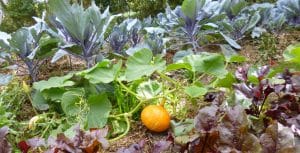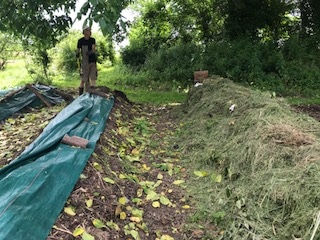
In a southwesterly corner of the Ziji Garden, beneath the soft shade of the old walnut tree lie rows of decaying mounds of vegetable waste and decomposing grass. The stench of rotting vegetables fills the air. If you’re searching for a place to contemplate impermanence, this is it.
All physical and mental events come into being and dissolve but we cant’ always see this dissolution happening in our lives – we become caught up in the content, trapped in webs of detail and discursive chatter. The compost area is like a physical manifestation of life’s continual and unending transmutation. Everything is in constant compost flux and the only certain thing is change.
In springtime, we marvel at the birth of all things new. We all know the genuine delight of watching seedlings sprout. In The Ziji Garden, this happens on an epic scale. Each day we are delighted by beetroot, kale and coriander pushing their way out of the soil towards the sunlight. The Japanese Knotweed takes hold – of everything – and we know summer is on its way. We recognise the celebration of birth and the beginnings of life, just as we do in our lives outside the garden.
Summer is rich and full, the sky is heated and heavy. Plants are laden with fruit and warm blooms. The branches of fruit trees arch over, the weight of apples and plums tugging them towards the ground. Marrows and squashes are so full they might burst. The world is hot and sexy. This is the time of year to observe the fullness and richness of life.
If there is a time of year that shares the beautiful and undeniable truth of death with us, it is autumn. The garden collapses into itself. Transient leafy phenomena folds itself back into the soft soil of fall and reminds us how enriching continual and unending change can be. Every dead plant will fuel the life of next spring’s seedlings. The Ziji garden and the world are in constant flux.
 And then – winter. The cold, dark aloneness of the season where nothing happens. But so much is happening, we just cant see it. It’s happening in the soil and in the compost pile.
And then – winter. The cold, dark aloneness of the season where nothing happens. But so much is happening, we just cant see it. It’s happening in the soil and in the compost pile.
Its hard to deal with impermanence in our lives – relationships and careers and houses that get messy. Contemplating impermanence in the garden offers us a way to consider this under the lens of nature’s cycles. The garden offers us a way to access the understanding of the instability of this phenomenal and human world and the world we create in our minds.
When things change, they often cease to be what we want them to be. In The Ziji Garden, and in the natural world generally, we can observe and sense and feel the positivity of impermanence. We can stop fighting our attachments and let go. It doesn’t matter if we only let go for a moment – we let go and we accept impermanence.
Bart’s words:
“When I step into the garden in the morning it dawns on me that everything in there is blooming and growing. At the same time the trees, plants and insects don’t bother that they will leave this beautiful Ziji Garden again. It reminds me to be grateful for the days I’m spending here, knowing that one day I will also leave this place. Every morning I walk into the garden and bow to the space before I enter, as an act of letting go and starting fresh. It feels appropriate to start the day in this way. This simple act brings a smile on my face, tears in my eyes and a warm feeling in my heart. May my time here be of benefit to many beings and may I develop kindness and warm-heartedness to be shared with many”.
Post writer: Cash Clay
